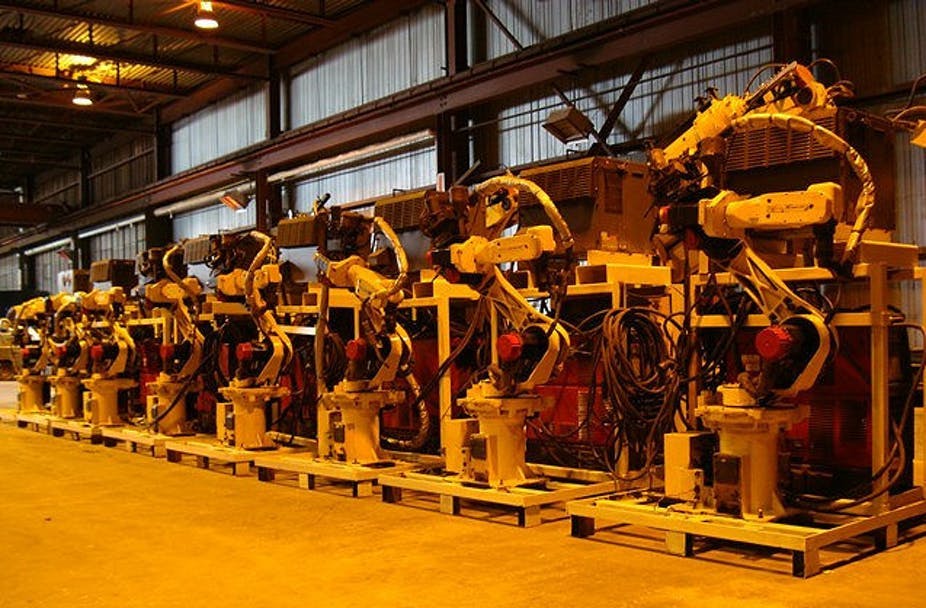The presence of robots in industry and beyond – factories are far from the only place where machines play a key role – is anything but new. In a July 2017 article written for the World Economic Forum, Jeff Morgan of Trinity College, Dublin, expresses amazement at the concern about new wave of automation. “Robots have been taking our jobs for 50 years, so why are we worried?” he writes.
Numerous recent works point the supposed dangers of digital technologies and the arrival of robots in our homes and especially in companies. Many scholars base their pessimism on philosophical analyses (our possible addiction to machines or even our enslavement) or more economic perspectives (the end of Schumpeter’s “creative destruction”, according to which new sectors and jobs replace those made obsolete by technical progress).
However, there is reason to be optimistic that the consequences of automation will not be determined by the technologies themselves, but rather by the choices we make in how they’re used. Carl Benedikt Frey and Michael Osborne of the Oxford Martin School concluded in 2013 that 47% of US jobs were threatened by automation. More recently, a study by the OECD put forward the figure of 9%, based on the awareness that new jobs would be created at the same time.
According to futurists, the phenomenon will become a structuring element of the economy in the years to come. Andrew McAfee and Erik Brynjolfsson call this the “second age of the machine”, an expression that confirms the fact that the new generation of robots are radically different from those that came before. That is why we can speak about the “fourth industrial revolution” or “robolution”.
The global potential for automation
A large proportion of companies around the world are still characterised by a low reliance on robots. This is surprisingly the case in developed countries, especially in Europe, where automation could be a way to increase productivity and to keep firms in place rather than seeing them go abroad. Sweden, Denmark and Germany are notable exceptions. But even in those countries, robots are far less numerous than in developed Asian countries such as South Korea, Singapore and Japan.
The case of France is particularly interesting: in a country known for its difficulty in maintaining domestic manufacturing capacity, the number of industrial robots remains low. According to a recent study by the International Federation of Robotics (IFR), there were 127 robots per 10,000 employees in the manufacturing sector in France in 2015, placing the country 14th in the world. A greater reliance on robots could be a solution needed to increase productivity and save local jobs.
Of course, the potential is even higher in countries relying exclusively on the labour force. Robots will quickly become easier and cheaper to use. That is why we can imagine a catch-up period in the coming years. This would naturally present a real concern for many workers, who would be right to wonder what will happen to their jobs. At the same time, an industry without workers seems difficult to imagine. My conviction is that the nature of jobs will change. And the adaptation to changes should be well prepared now.
The essential role of training
Training is essential for reducing fear linked to increased automation. Beyond helping manage what is a legitimate fear, training enables the development of technical skills required for the emergence of new jobs. Digital officers, developers, community managers, cybersecurity analysts, remote plant pilots, data scientists – elected the sexiest job in the 21st century by the Harvard Business Review – are new jobs with new professional opportunities and require skills that are still largely lacking in the labour market. The new generation of robots are really different from the previous ones – they’re now more flexible and collaborative. And artificial intelligence will take a more and more important role in many productive contexts. This evolution requires that workers develop new skills.
Beyond technical expertise, a need for specifically human skills also emerges: emotional intelligence and relational competences, both of which robots do not currently master. Their development – which also involves real training – will undoubtedly become the essential condition for the jobs expected to be created in the future. Human relationships thus remain central to the success of companies and firms, and cannot be improvised or decreased: the real investment efforts in the coming years concern human capital, not just technology.


